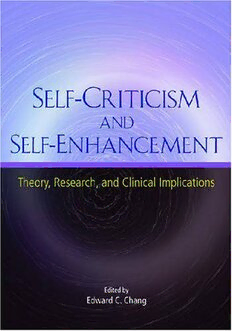
Self-Criticism and Self-Enhancement: Theory, Research, and Clinical Implications PDF
287 Pages·2007·16.091 MB·English
Most books are stored in the elastic cloud where traffic is expensive. For this reason, we have a limit on daily download.
Preview Self-Criticism and Self-Enhancement: Theory, Research, and Clinical Implications
Description:
In recent years we have witnessed a proliferation of writing on "positive psychology" that focuses on variables such as optimism, personal control, self-esteem, and personal striving. At the same time, much of recent pop psychology has emphasized the importance of overcoming different forms of self-criticism, including poor self-esteem and perfectionism. These positive or negative variables clearly influence the quality of our lives. But is self-criticism always a bad thing, and is self-enhancement really so unequivocally good? What are the costs and benefits associated with each? In Self-Criticism and Self-Enhancement: Theory, Research, and Clinical Implications, editor Edward C. Chang has enlisted over 25 distinguished psychologists and scholars who present the pros and cons of regarding self-criticism or self-enhancement as either "good" or "bad." Collectively, they illustrate the benefits of evaluating these concepts more complexly to demonstrate how negative and positive psychological variables may function as a virtue in one situation and as a vice in another situation. Drawing on the works of both philosophers and researchers, the contributors search for a deeper and broader understanding of these fundamental psychological concepts, and they evaluate their effect on individuals and the larger society.
See more
The list of books you might like
Most books are stored in the elastic cloud where traffic is expensive. For this reason, we have a limit on daily download.
